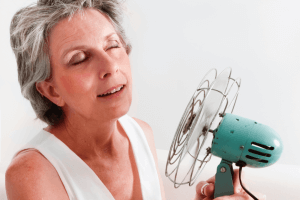Lisa is in perimenopause but doesn't know it.

Could you be like Lisa?
Lisa is 46 years old and leads a busy life as a senior business manager and mother of three teenage children. She is perimenopausal, but doesn’t know it. Although they are becoming irregular, she is still having her periods, and she isn’t having hot flushes so she confidently takes this as meaning she hasn’t reached menopause yet.
What she doesn’t realise is that the signs of perimenopause are the same as the signs associated with menopause – and there are so many more signs than hot flushes. Left untreated, they can have a dramatic influence on her health.
What are signs of perimenopause for Lisa?
Lisa used to be such a sound sleeper, but lately she’s been waking in the middle of the night and can’t get back to sleep. She lies awake and worries about her children, her work, her relationships and herself. Her sleeplessness is starting to take a toll.
She is over-tired during the day and suffers from irritability – watch out children and workmates!
She used to be so driven, but right now, her energy levels are strangely low. She puts this down to her disrupted sleep, and cuts back on exercise, making her feel even worse.
The stress of balancing work and family demands, that she once proudly managed like an expert juggler, is now suddenly overwhelming. And to top things off she is experiencing anxiety attacks. There are times when she actually thinks she is going crazy…..so she’s booked herself an appointment with a counsellor.
Related Articles

Viv’s Aware of Post-Menopause Body
What does this mean for her? Postmenopausal for the rest of your life! Viv is 58 and had her last

Rachel gets Persistent Hot Flushes
Are you feeling the heat of menopause like Rachel? Rachel definitely knows she is menopausal Rachel works full time in

Early Menopause for Teresa
Teresa’s cancer battle was tough enough. Now menopause… Artificial menopause can result from chemotherapy Teresa is only 38. At the

Lisa is Perimenopausal
Lisa is in perimenopause but doesn’t know it. Could you be like Lisa? Lisa is 46 years old and leads






